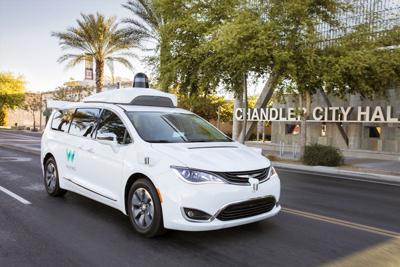Who is liable for a car accident when no one’s driving the car?
That was one of several questions explored by experts in Arizona’s autonomous vehicle industry during a special symposium last Thursday as representatives from public and private sectors hashed out what the near future looks like for driverless cars.
As more self-driving cars move around the East Valley, stakeholders and policymakers gathered in Chandler to discuss how Arizona will adapt to the rapidly-developing technology.
“A lot of work needs to be done,” said Jill Sciarappo, senior marketing director for Intel, “and we need to come together to solve a lot of problems to make that happen.”
A reoccurring theme of the symposium, organized by the Chandler Chamber of Commerce, involved the liability factors involving self-driving cars.
“That is an enormous issue,” said Patricia Doersch, an attorney specializing in transportation. “That’s a bear at the federal level.”
If humans no longer control their vehicles, the courts will have to decide whether they can still be held liable for accidents and property damage.
Some experts have suggested judges think of self-driving cars as analogous to elevators, autopilot systems – or horse-drawn carriages.
The laws currently on the books were written to regulate human drivers, who are expected to have the ability to adhere and react to certain environments on the road.
“But now the (computer) system is the driver, so there may be a little bit of grey area there,” said Kevin Biesty, deputy director of policy for the Arizona Department of Transportation.
For example, Biesty mentioned how adult drivers can be held criminally liable for leaving children unattended in a car. But it’s unclear whether the same standard should apply to self-driving cars, he added.
The insurance industry is grappling with similar questions of how to factor autonomous vehicles into its business model.
Drivers have traditionally borne the risks associated with driving, but companies now have to evaluate who or what takes on that risk.
Doersch expects Congress to draft a bill next year that finally addresses some complex issues surrounding autonomous vehicles.
But it may be too late by the time legislation is passed, she added, because the technology keeps evolving and changing.
“Congress is terrified of looking stupid and getting it wrong,” Doersch added.
Chandler was the appropriate location to host the first-ever symposium dedicated to the self-driving industry.
The city is home to Waymo, which operates an autonomous ride-share service in the East Valley, and was one of the first municipalities to pass an ordinance related to self-driving cars.
“Autonomous vehicles could really change the way that cities look in the future,” said David de la Torre, Chandler’s planning manager.
The city last year passed new requirements for office buildings that will have workers arriving in autonomous vehicles, reducing the number of parking spaces that normally would be mandated when most employees drove themselves while requiring larger areas for drop-offs and pick-ups.
City officials also have talked of one day working out arrangements with Valley Metro that would allow driverless cars to pick up passengers at the agency’s bus stops/
Cities in Arizona could become more pedestrian-friendly as autonomous taxis and shuttles become the norm, de la Torre said, and the demand for parking spaces starts to drop.
“We’re gonna need to find out what to do with all those parking lots that are out there,” de la Torre added.
Because these vehicles are constantly gathering data and surveying their surroundings, some wonder what keeps them from becoming vulnerable to hackers.
“That’s the big question,” said Ram Pendyala, a professor from Arizona State University’s School of Sustainable Engineering and the Built Environment.
He thinks data is the biggest ethical dilemma of the self-driving industry; not only regarding how it’s protected, but in terms of how companies decide who has access to their information.
Chandler currently has no data-sharing agreement with Waymo or any other companies, but representatives said the city may consider it in the future.
If these cars have a security breach, Pendyala said it’s unclear to him who to assign blame.
“It’s really hard to say who’s responsible,” he said.
Many symposium attendees thought regulating self-driving cars too heavily during this infancy stage would stifle innovation.
The cars are intended to make roads safer, some attendees said, and that seems to be the industry’s main priority.
The regulations will come at some point, said state Rep. Jeff Weninger, R-Chandler, but Arizona has taken a good approach by letting the technology flourish.
Weninger thinks these smart cars can make better decisions than most human drivers. He recently saw a Dodge Caravan drive down the freeway with eight mattresses strapped to its roof.
“I doubt the autonomous car is gonna make a poor decision like that,” the lawmaker joked.







